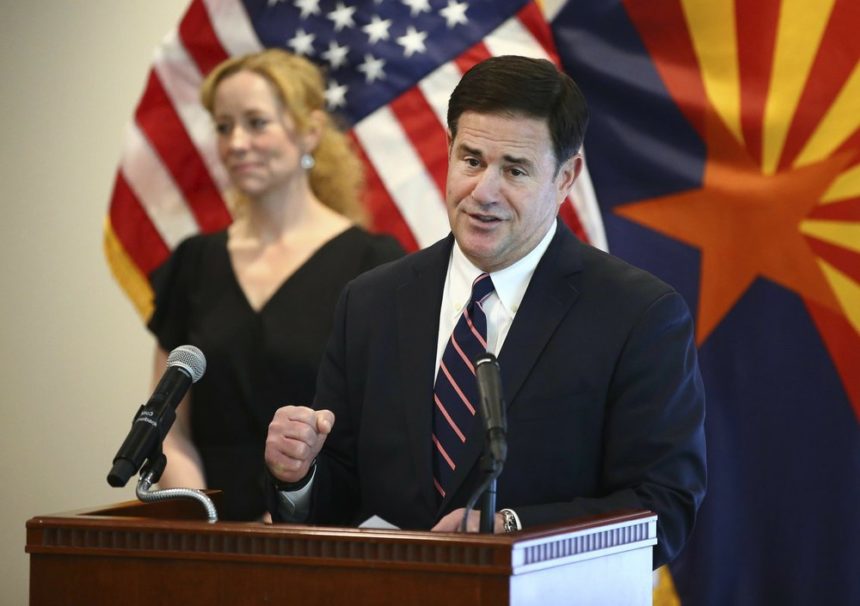Arizona governor eyes reopening economy ‘when it’s safe’

PHOENIX (AP) — Gov. Doug Ducey said Tuesday he’s beginning discussions about how to ease up on the social distancing requirements that have left businesses closed and a record number of workers jobless.
But he says nobody should expect the economy to turn back on as quickly as it came grinding to a halt in an effort to control the spread of the coronavirus.
“It’s not like turning off the light switch and turning on the light switch,” Ducey told reporters during a briefing on the state’s response to the coronavirus. “It’s about making the right decisions at the right time.”
Ducey said his current stay-at-home order is in effect through April 30, and it’s an “aspirational” goal to ease restrictions on businesses after that. But he said he’d extend or revise his orders if necessary. Ducey has ordered bars, gyms, beauty salons and a variety of other nonessential businesses to close, and he’s restricted restaurants to takeout only.
“At the appropriate time, when it’s safe, we will begin to reenergize our economy one step at a time,” Ducey said.
Later, he elaborated on potential scenarios to reopen the economy, saying perhaps restaurants could open with half their normal capacity. He said people who’ve been recently tested might be able to wear a marker noting they’ve been cleared, which he likened to an “I voted” sticker on Election Day.
“Of course, we’re going to respect people’s privacy and their constitutional rights,” he said on Phoenix radio station KTAR-FM.
He said he’s asked the leaders of Arizona’s tourism and economic development offices to work with business leaders on a plan for easing restrictions.
Ducey said he’s not working with other governors on a joint reopening plan, as the governors of California, Oregon and Washington said they’d do for the West Coast and several northeastern governors said they’d do for the New York region.
Arizona continues to see a massive increase in unemployment filings as people who lost their jobs apply for benefits. The state reported it had more than 95,000 new claims last week, bringing the four-week total to more than 342,000. The average before the virus hit was about 3,500 claims a week.
The number of confirmed cases of COVID-19, the disease caused by the coronavirus, rose to 3,806 of Tuesday, according to the Arizona Department of Health Services. The state reported nine additional deaths, bringing the total to 131 since the first death was reported on March 21.
Navajo Nation officials report the number of positive tests for COVID-19 in the vast reservation had reached 838 as of Tuesday with 33 known deaths. That’s an increase of 25 cases and five deaths from Monday.
Tribal officials said 270 cases are in Arizona’s Navajo County. The Navajo Nation is the largest Native American reservation in the U.S. and spans parts of Arizona, New Mexico and Utah.
Ducey signed an executive order Tuesday waiving medical privacy laws to allow police officers and other first responders to be notified when they’re responding to an address where someone has tested positive for COVID-19 in the last 14 days. He says it would allow first responders to take appropriate precautions.
University of Arizona President Robert Robbins said the university is almost ready to begin antibody tests that will tell whether someone has previously contracted the coronavirus, whether they’re currently ill or have fully recovered. He said the tests will be offered to front-line medical personnel and first responders, as well as all students, faculty and staff at the university.
For most people, the new coronavirus causes mild or moderate symptoms, such as fever and cough that clear up in two to three weeks. For some, especially older adults and people with existing health problems, it can cause more severe illness, including pneumonia and death.
The U.S. Department of Transportation’s Federal Aviation Administration announced Tuesday that it will award nearly $225 million to 59 Arizona airports to help respond to the coronavirus pandemic.
Nearly $148 million is earmarked for Phoenix Sky Harbor International Airport with Tucson International Airport getting more than $22 million with Phoenix-Mesa Gateway Airport over $20 million.
The funding is part of $10 billion in economic relief for U.S. airports as part of the Coronavirus Aid, Relief, and Economic Security (CARES) Act passed by Congress and signed into law by President Donald Trump last month.
Authorities said the funds are available for airport capital expenditures, airport operating expenses including payroll and utilities, and airport debt payments.
Meanwhile, Mesa’s city manager recommended that the council keep city libraries, arts center, museums and parks and recreation facilities closed through September, the Arizona Republic reported. Mesa is Arizona’s third most populous city.